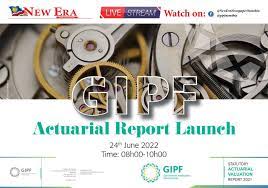
GIPF reports financially stable condition, as board approves Pension Backed Home Loan facility

By Clifton Movirongo.
The Government Institutions Pension Fund (GIPF) recently revealed that the fund is in a financially sound condition after recording an actuarial surplus that amounted to N$ 16,522 billion and a funding level of 113,89% as of 31 March 2021.
This was disclosed at the launch of GIPF’s Statutory Actuarial Valuation Report for 2021 held on Friday last week.
Chairperson of the fund’s board of trustees, Nillian Mulemi, noted that the fund met its target funding level of between 105% and 115%, and as a result, the fund’s assets were sufficient to cover its core liabilities.
This includes retirement benefits, death benefits, disability benefits, exit benefits (resignation, retrenchment, etc.), and any other benefits prescribed by the rules of the fund.
However, Mulemi cautioned that while the level of the surplus was sufficient for the fund to meet its liability, the trustees have recognised that the fund is showing signs of maturity.
“Thus, the fund requires active monitoring to ensure that robust investment strategies are implemented to satisfy the growing liability,” she added.
Elsewhere, the fund’s Chief Executive Officer, David Nuyoma, announced that the GIPF’s board has approved the Pension Backed Home Loan facility, a tool that will be used for a scheme that allows members to acquire and or renovate homes in both proclaimed and unproclaimed areas.
“This will be used by members of the fund to cover acquisitions and improvement on properties of members. The rollout will be covering the whole country, unlike previous support measures in the form of a mortgage loan facility that has been ongoing since 2014. We look forward to this to be rolled out very soon,” Nuyoma said at the launch.
He, however, maintained that for the facility to be rolled out, the fund needs to have a clear understanding with its members’ employers, both from the government and other entities that are members of GIPF.
“We have been engaging with the principal employer, the government, through the Office of the Prime Minister and we at a technical level have reached an understanding for the rollout of this facility,” he added.
Nuyoma also added that GIPF will soon make all the necessary announcements as the fund is still waiting for signing thereof and the ministry of finance’s approval, it being the financial advisor and paymaster to cover the employees.
According to the report, the actuarial valuation revealed that expenses incurred approximately 1,58% of payroll and that benefit payment exceeded contributions received in the inter-valuation period.
Meanwhile, the fund’s actuaries, Humanity Employee Benefits Co (Pty) Ltd, recommended the fund to marginally increase the reserving allowance for expenses from 1,40% of payroll to 1,50% of payroll in the valuation.
At the same time, Humanity Employee Benefits also noted that the fund was valued at N$135,8 billion and owes its members N$118,9 billion.
“We recommend that the Trustees consider reviewing the annuity and withdrawal that are used to calculate member benefits to align them with the revised long assumption. We further recommend that the Trustees consider establishing a formal governance policy which will set out the formal actions and outcomes from the review of these factors on a triennial basis,” said the actuaries in their valuation report.
It was also recommended that the AIDS Reserve be renamed to Mortality Reserve to cover a wide variety of mortality risks not only limited to AIDS.












































